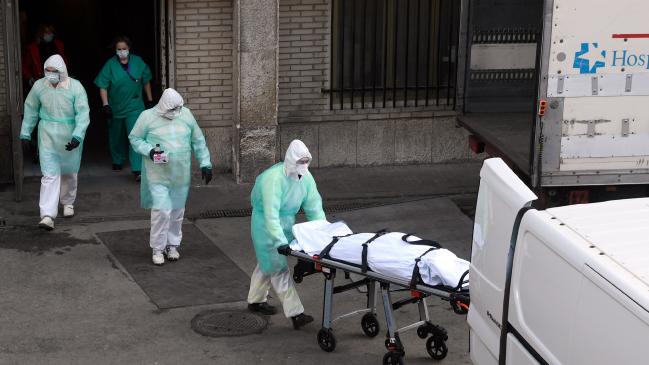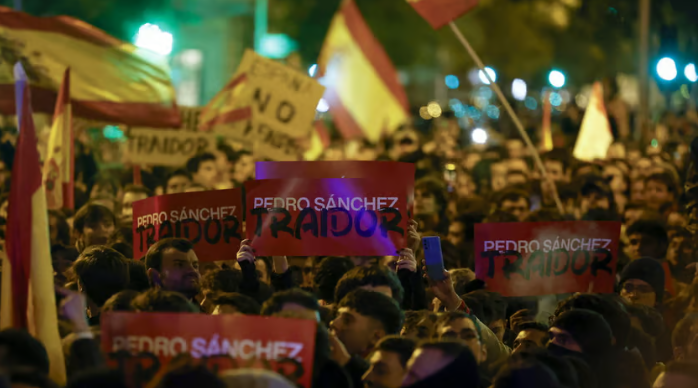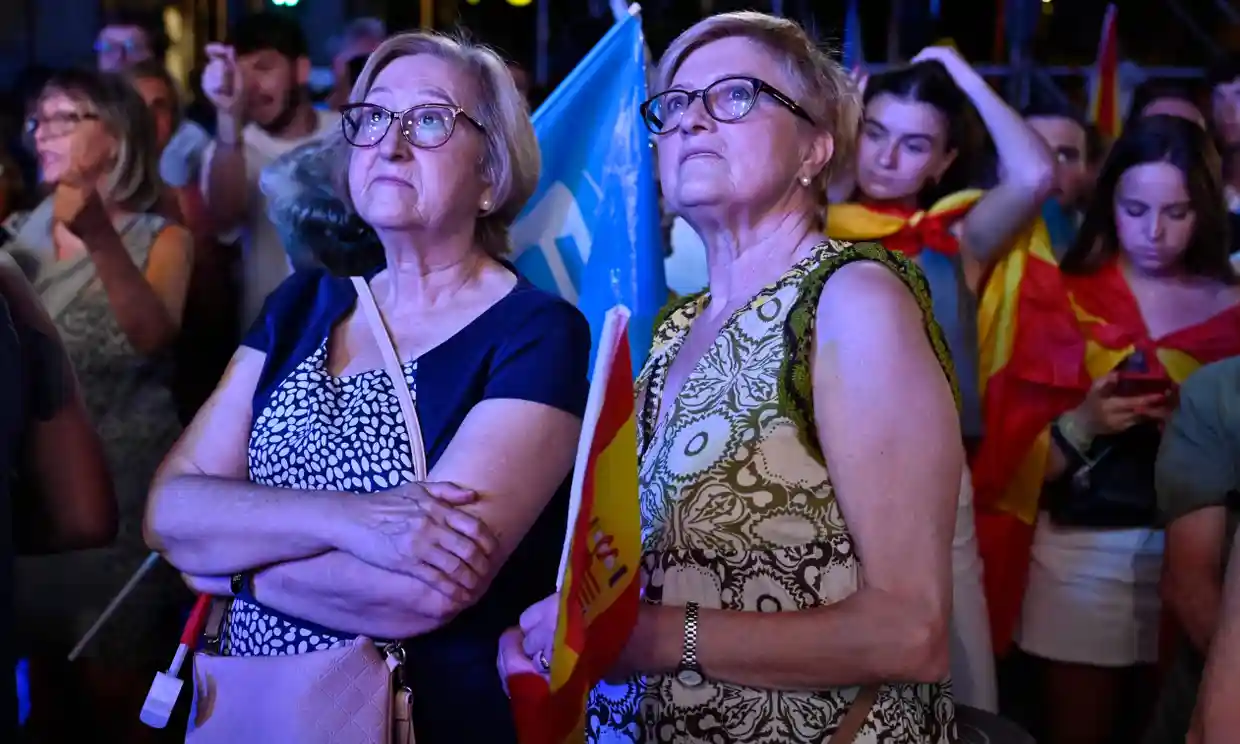This article is more than
4 year oldCoronavirus Spain: ‘Extreme’ lockdowns save lives but risk killing economy

When the giant papier-mâché figures started to come down, we knew it was serious.
In Valencia, Spain’s third city, March is all about the iconic Las Fallas festival. Characterised by daily fireworks and all-night partying, the festival is also famous for the ninot sculptures that appear on street corners. The elaborate, colourful creations stand up to 6m tall, crafted by artists at costs that can reach hundreds of thousands of euros.
For many Valencians, Las Fallas is the highlight of their year. For the city, it is worth up to €500 million ($A840 million) in tourist trade.
On March 10, the inevitable decision was made. The festival would be cancelled for the first time since 1939. The sculptures, which are typically burned in a citywide bonfire marking the end of Las Fallas, started to be dismantled.
Four days later, when the festival should have been in full swing, the Spanish Government announced a state of alarm and nationwide lockdown with some of the world’s strictest conditions. At the time, around 12 people were dying from coronavirus every day. Things were about to get much worse.
Within a month, the daily death toll had reached a peak of more than 900. Hospitals were overwhelmed and medical staff left without sufficient protective equipment. Horrific stories emerged. An ice rink in Madrid had to be used as a temporary morgue. Residents in care homes were found abandoned, and sometimes dead.
For a time, Spain was the world’s deadliest hotspot for the pandemic. The country’s current death toll is more than 26,000 and it has had more than 250,000 confirmed cases of coronavirus.
RELATED: Follow the latest coronavirus updates
RELATED: When will lockdowns end in my state?

|
LIFE IN LOCKDOWN
My wife and I moved to Valencia from Brisbane two-and-a-half years ago. We have found the Spanish to be a sociable, friendly people who live much of their life outside. There are coffees with friends on sunny cafe terraces and family lunches in shaded restaurant courtyards.
So to suddenly be locked down was an unfamiliar feeling. We were only permitted outside for essential trips to the supermarket or pharmacy – and only alone. Those with dogs could take them outside, but not for a proper walk.
The police enforced these rules with large fines. Viral news stories told of couples fined for shopping together and a man punished for buying only Coca-Cola, chocolate and sausages from a supermarket. The police told him these were not essential products and handed him a fine – worth far more than his purchases.
We stayed inside our small apartment, relying on supermarket deliveries and occasional trips to the communal roof terrace for a breath of fresh air. Exercise was yoga videos in the living room or awkward laps of the apartment.
RELATED: Your most googled coronavirus questions
RELATED: All the fines you can cop for ignoring virus rules

|
After seven weeks in lockdown, last weekend we were allowed outside for exercise. There are different time periods for adults, children and over-70s to exercise individually. On Saturday morning, we emerged from our apartment blinking at the sun and went for a walk in the city for the first time in 48 days.
SECOND WAVE HITS
The lockdown conditions were extreme compared to other countries and there has been a sharp drop in Spain’s daily death toll, which is now around 200. There is hope the worst is over.
As deaths fall, attention is turning to the economy and the disastrous hit Spain is expected to take. People here still regularly talk of the “crisis”, the 2008 global financial crash that crippled the country’s economy and left millions unemployed. Spain had just about got back on its feet when the pandemic struck.
In March, a record number of workers, about 900,000, lost their jobs, according to social security data. The tourism industry, one of Spain’s most important, will be praying air travel will have resumed in time for the European summer, however unlikely that seems. The sun-drenched resorts on Spain’s east and south coasts could well be empty this season.
There are some small signs of hope. Next week, in phase one of the Spanish Government’s four-stage plan to take the country to a “new normality”, bars and restaurants can open outdoor areas with 50 per cent capacity.
RELATED: Can you catch coronavirus twice?
RELATED: What are your chances of dying from coronavirus?

from the pandemic will last years. Picture: Oscar Del Pozo/AFPSource:AFP |
Other small businesses have also reopened. My barber will wear a mask and gloves to cut my hair in his disinfected shop, meaning I can avoid another homemade haircut.
The priority, of course, is reducing the number of deaths while slowly restarting the economy.
The government has warned rises in cases will see lockdown measures retightened. But some people are growing frustrated. Spaniards lived under a dictatorship until 1975 but they embraced democracy when it arrived and are not afraid to stand up to their government.
Opposition parties are criticising the coalition government’s approach. A vote on Wednesday to extend emergency powers until May 24 only passed after last-minute support.
TOO LITTLE, TOO LATE
Scrutiny of Spain’s response to the pandemic will continue. The world watched in shock as Italy struggled to cope with cases of the pandemic. Some think Spain was too slow to act to what it should have seen coming from its Mediterranean neighbour. Spain now has more confirmed cases of COVID-19 than Italy, if not as many deaths.
With hindsight, the decision to allow hundreds of thousands to gather on March 8 in cities across Spain for International Women’s Day has been criticised. So too – though it was not the government’s decision – has the Champions League football match in February between Atalanta, a team from the hard-hit north of Italy, and Valencia. Nearly 2500 fans travelled from Valencia to the match, which has been described as a “biological bomb”.
RELATED: Warning second wave could hit Italy

|
The temptation now will be to rush the economy back into action and bring life back to something like normal. But the government will know any recklessness will undermine its strategy and probably cost lives. If it really was too slow to react at the start, it now must be patient until the end.
In Valencia, there was initially hope the Las Fallas festival could be delayed until July. That won’t happen. Today, the dazzling sculptures sit solemnly in dark warehouses. When they can come out again is a question no one can answer.
Robert Kidd is a freelance writer | @Rob_Kidd1
Keywords
Newer articles
<p>Chinese officials say they "firmly oppose" the platform being divested.</p>
Apple deletes WhatsApp, Threads from China app store on orders from Beijing
TikTok ban now ‘inevitable’
Ukraine ‘will have a chance at victory’ with new US aid, Zelenskyy says
Tumultuous Trump trial day ends with 12 jurors, 1 alternate selected
Israel Iran attack: Damage seen at air base in Isfahan
Israel Launches Retaliatory Strike Against Iran
Who will be Trump’s VP? A shortlist
‘URANIUM’: Terrifying detail about Israel’s strike on Iran emerges
Netflix Password Crackdown Delivers Millions of New Customers




